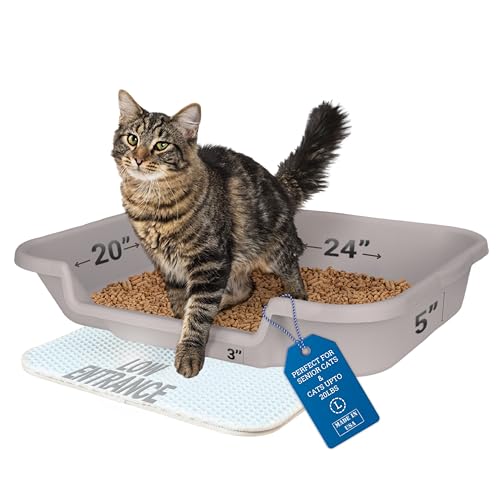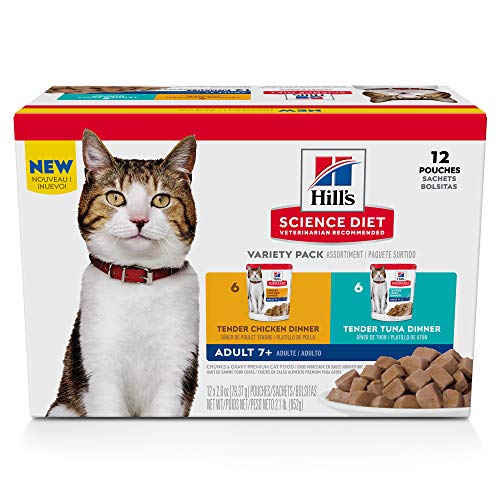Constipation is a common problem in older cats. It occurs when the stool becomes hard and dry, making it difficult to pass. Constipation can cause discomfort, pain, and loss of appetite in senior cats. It can also lead to more serious health issues, such as obstipation, megacolon, or bowel obstruction. Therefore, it is important to recognize the signs of constipation in your senior cat and take appropriate steps to treat it. Let us explore senior cat constipation issues, causes, symptoms and prevention.
What Causes Constipation in Senior Cats?

Many factors can contribute to constipation in senior cats, such as:
- Age-related changes: As cats age, their digestive system becomes less efficient and their bowel movements become less frequent. They may also have reduced muscle tone and nerve function in their colon, which affects the movement of the stool.
- Diet: A low-fiber, high-protein, or dry diet can cause the stool to become hard and dehydrated. Cats need adequate water intake and fiber to keep their stool soft and moist. Some senior cats may also have difficulty chewing or swallowing their food, which can affect their digestion.
- Lack of exercise: Senior cats tend to be less active and more sedentary than younger cats. This can lead to obesity, which puts pressure on the abdomen and the colon. It can also reduce the blood flow and oxygen to the digestive organs, which can impair their function.
- Dehydration: Senior cats may not drink enough water, especially if they have kidney disease, diabetes, or hyperthyroidism. These conditions can cause increased urination and fluid loss, which can lead to dehydration. Dehydration can make the stool dry and hard and also affect the lubrication of the colon.
- Medications: Some medications, such as opioids, antihistamines, diuretics, or antacids, can cause constipation as a side effect. They can affect the motility of the colon, the hydration of the stool, or the secretion of mucus in the intestine.
- Stress: Senior cats may experience stress due to changes in their environment, routine, or social interactions. Stress can affect the nervous system and the hormones, which can alter bowel function and cause constipation.
- Underlying diseases: Some diseases, such as arthritis, spinal cord injury, anal gland infection, tumors, or megacolon, can cause constipation in senior cats. They can affect the structure, function, or innervation of the colon, or cause inflammation, obstruction, or compression of the bowel.
What are the symptoms of constipation in senior cats?

The most obvious symptom of constipation in senior cats is the absence or difficulty of defecation. A normal cat should poop at least once a day, and the stool should be soft, moist, and well-formed. A constipated cat may poop less often, or not at all, and the stool may be small, hard, dry, or crumbly. Other symptoms of constipation in senior cats include:
- Straining or crying while trying to poop
- Frequent visits to the litter box with no result
- Swollen or bloated abdomen
- Loss of appetite or weight loss
- Lethargy or depression
- Vomiting or gagging
- Blood or mucus in the stool
- Dragging the rear end on the floor
If your senior cat shows any of these symptoms, you should take it to the vet as soon as possible. Constipation can be very uncomfortable and painful for your cat and can lead to serious complications if left untreated.
How Is Constipation in Senior Cats Treated?

The treatment of constipation in senior cats depends on the severity and the underlying cause of the problem. The vet may perform a physical examination, blood tests, urine tests, x-rays, or ultrasound to diagnose the condition and rule out any other diseases. The vet may also manually palpate or examine the rectum and the colon to assess the amount and consistency of the stool. Based on the diagnosis, the vet may recommend one or more of the following treatments:
- Manual removal: The vet may use a gloved finger or a lubricated instrument to gently remove the impacted stool from the rectum. This may require sedation or anesthesia for your cat and may cause some bleeding or discomfort. The vet may also flush the colon with warm water or saline solution to soften and remove the stool.
- Enemas: The vet may administer an enema, which is a liquid solution that is injected into the rectum to stimulate bowel movement and lubricate the stool. The enema may contain water, saline, mineral oil, or other substances that can help with constipation. The vet may also teach you how to give your cat an enema at home if needed.
- Laxatives or stool softeners: The vet may prescribe oral or injectable medications that can help with constipation. These may include lactulose, cisapride, or miralax, which can increase the water content and the motility of the colon. These medications should be used with caution and under the vet’s supervision, as they can cause diarrhea, dehydration, or electrolyte imbalance if overdosed or misused.
- Dietary changes: The vet may advise you to change your cat’s diet to a high-fiber, low-protein, or wet food diet. This can help to keep the stool soft and moist and prevent dehydration. You may also need to add fiber supplements, such as psyllium, pumpkin, or bran, to your cat’s food. You should also make sure that your cat has access to fresh and clean water at all times, and encourage it to drink more by using a fountain, a bowl, or a syringe.
- Exercise: The vet may suggest that you increase your cat’s physical activity, as this can help to stimulate bowel function and prevent obesity. You can play with your cat, provide it with toys, or encourage it to explore new areas. You should also provide your cat with a comfortable and clean litter box, and avoid any stress or changes that can affect its bowel habits.
- Surgery: In some cases, surgery may be necessary to treat constipation in senior cats. This may be the case if your cat has a bowel obstruction, a tumor, a megacolon, or a spinal cord injury that affects the colon. The vet may perform surgery to remove the obstruction, the tumor, or part of the colon, or to repair the spinal cord. Surgery is usually the last resort, as it can have risks and complications, and may require lifelong care and medication for your cat.
How Can Constipation in Senior Cats Be Prevented?
Constipation in senior cats can be prevented by following some simple tips, such as:
- Feeding your cat a balanced and age-appropriate diet that is high in fiber and moisture, and low in protein and fat
- Providing your cat with plenty of fresh and clean water, and encouraging it to drink more
- Keeping your cat active and fit, and avoiding obesity
- Maintaining a regular and consistent routine for your cat, and minimizing stress and changes
- Checking your cat’s litter box daily, and monitoring its bowel habits and stool quality
- Take your cat to the vet for regular check-ups, and follow the vet’s advice on medications and supplements
- Seeking veterinary attention as soon as you notice any signs of constipation or other health problems in your cat.
Nutrition and Digestive Health for Senior Cats
As cats age, their nutritional needs evolve, and maintaining digestive health becomes increasingly important. Senior cats, especially those aged 7 years and older, require food that supports their overall health, including heart, kidney, and joint function, as well as digestive comfort.
One highly recommended option is Hill’s Science Diet Adult 7+, Senior Adult 7+ Premium Nutrition Wet Cat Food. This food is specially formulated for senior cats and includes essential nutrients like taurine for heart health, omega-3 and omega-6 fatty acids for a healthy coat, and natural fibers for digestion.
- Ingredients: Chicken, beef, chicken liver, and a blend of vitamins and minerals
- Benefits: Supports heart health, kidney function, and a healthy coat
- Use: Ideal for daily meals to ensure your senior cat gets the nutrition they need
Another excellent choice for supporting digestive health is Blue Buffalo True Solutions Blissful Belly. This cat food is formulated with prebiotics and natural ingredients to promote healthy digestion and gut health.
- Ingredients: Chicken, brown rice, pumpkin, and a blend of prebiotics
- Benefits: Supports digestive health and reduces digestive discomfort
- Use: Suitable for cats with sensitive stomachs or occasional digestive issues
Recommendation
If you want to give your senior cat the best nutrition and support their digestion, try Hill’s Science Diet Adult 7+ Premium Nutrition Wet Cat Food and Blue Buffalo True Solutions Blissful Belly. You can find them on Amazon. These products are great for keeping your cat healthy and comfortable. These products can make a significant difference in your cat’s health and well-being.
Conclusion
Constipation is a common and treatable problem in senior cats. It can cause discomfort, pain, and loss of appetite in your cat, and can lead to more serious health issues if left untreated. Therefore, it is important to recognize the signs of constipation in your senior cat and take appropriate steps to treat it. By following the vet’s recommendations and making some dietary and lifestyle changes, you can help your senior cat to have a healthy and happy life.
Disclosure: This content is reader-supported. As an Amazon Associate, we earn from qualifying purchases. Thank you for being so supportive!










